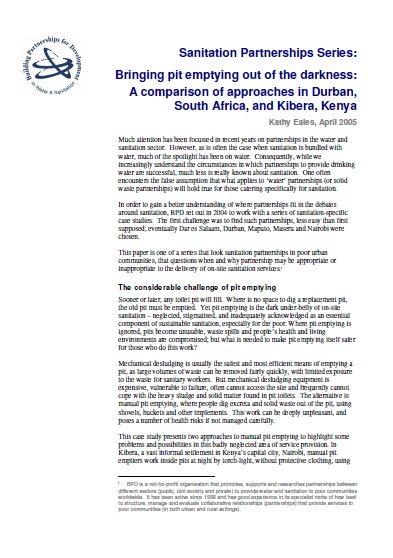Still have questions?
You could not find the information you were looking for? Please contact our helpdesk team of experts for direct and individual support.

Author: Eales, K.
Year: 2005
Publisher: Building Partnerships for Development (BPD), Water and Sanitation for the Urban Poor (WSUP), UK
This case study presents two approaches to manual pit emptying to highlight some problems and possibilities in this badly neglected area of service provision. In Kibera, a vast informal settlement in Kenya’s capital city, Nairobi, manual pit emptiers work inside pits at night by torch-light, without protective clothing, using rented basic equipment, subject to abuse and stigmatization, and dependent for jobs on agents of the landlords; the waste is commonly disposed of by dumping it into the settlement’s streams. By contrast, city management in Durban, South Africa, is experimenting with a small contractor development-cum -franchise model for manual pit emptying: sub-contractors will employ teams of wage labourers who enjoy the protection of the law, and who work in daylight with long-handled shovels, heavy gloves and gumboots, transferring pit waste from drums to specially modified waste skips, where it is screened before being disposed of safely.
"*" indicates required fields
You could not find the information you were looking for? Please contact our helpdesk team of experts for direct and individual support.


This website uses cookies so that we can provide you with the best user experience possible. Cookie information is stored in your browser and performs functions such as recognising you when you return to our website and helping our team to understand which sections of the website you find most interesting and useful.
Strictly Necessary Cookie should be enabled at all times so that we can save your preferences for cookie settings.
If you disable this cookie, we will not be able to save your preferences. This means that every time you visit this website you will need to enable or disable cookies again.
This website uses Google Tag Manager to collect anonymous information such as the number of visitors to the site, and the most popular pages.
Keeping this cookie enabled helps us to improve our website.
Please enable Strictly Necessary Cookies first so that we can save your preferences!
More information about our Cookie Policy
